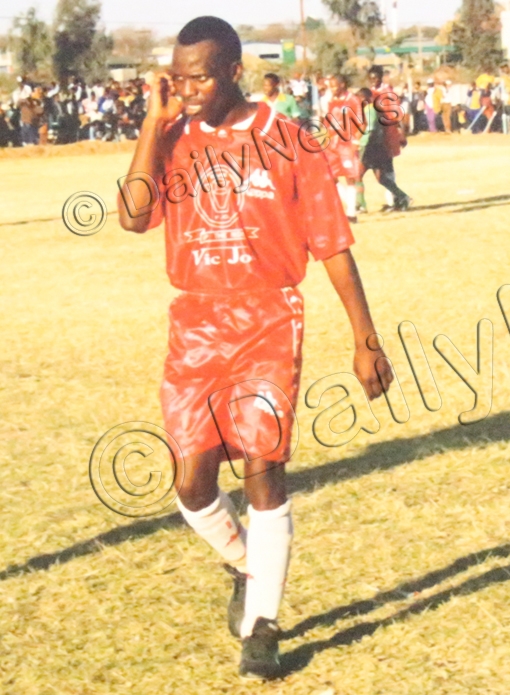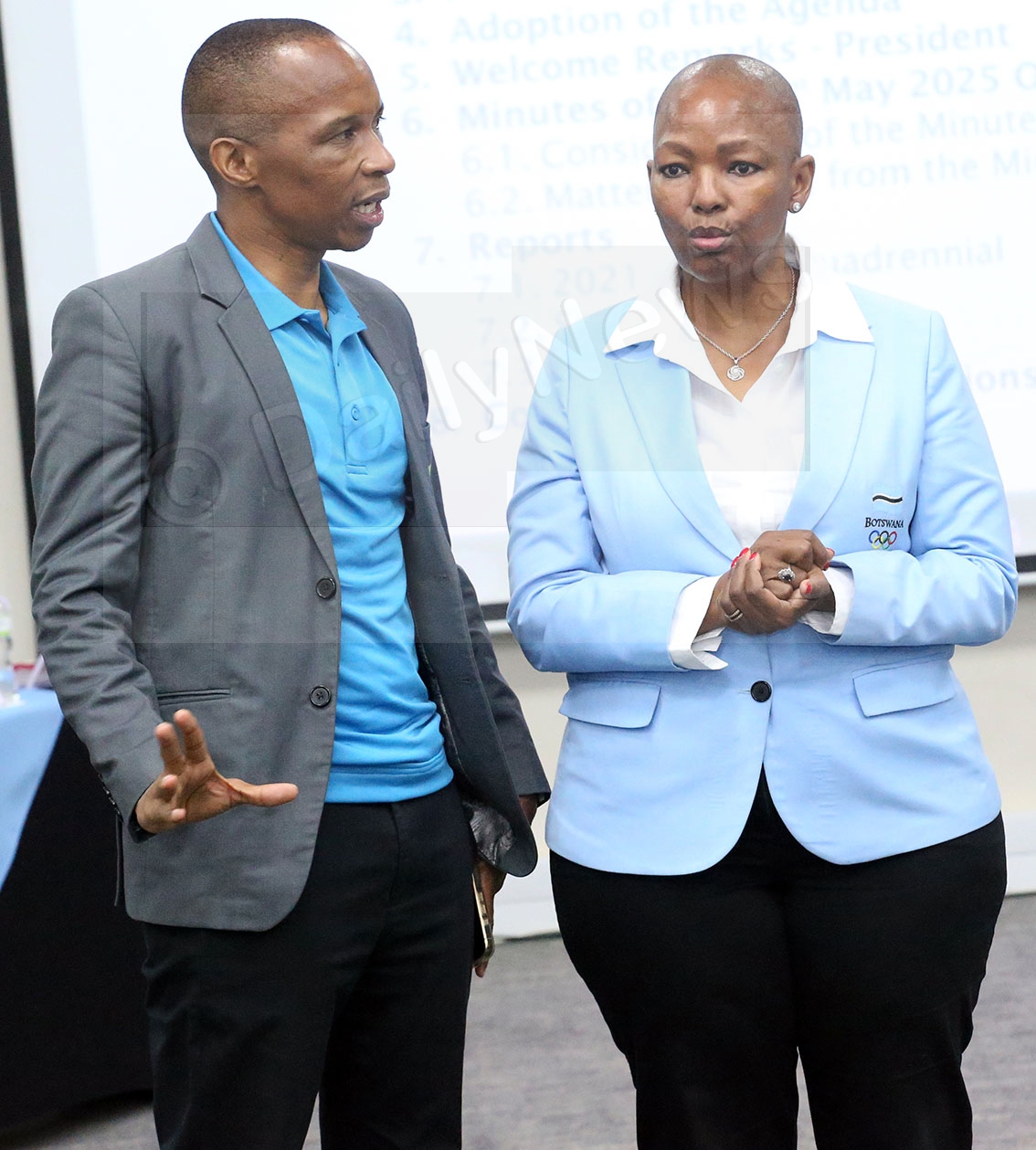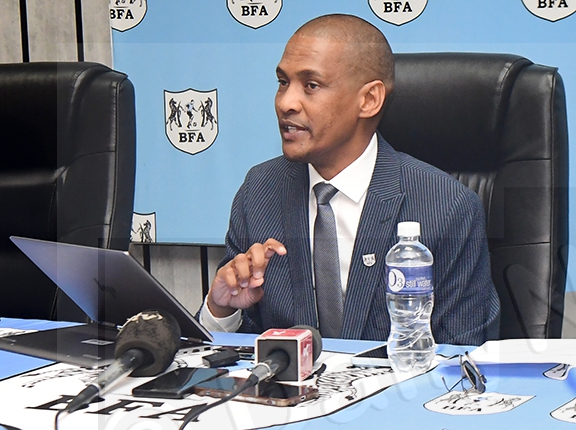Remembering past football heroes
07 Jul 2016
One fateful Saturday afternoon in May 2000, a legendary football player arrived back in Francistown to find his team trailing 2-0 at half-time in a decisive league game.
He was not happy. Not happy at all because, not only was the game crucial for his team to stay just afloat of what was then known as Super League, the pride of winning a home-ground battle was equally at stake.
The 35-year-old player swore to himself that anything was possible. After recess, and rare as it was for him to go in from the bench, the star was introduced, conceivably to give a jab to the play.
Within minutes, this substitute had dismantled and demoralised the visiting and fearful Notwane Football Club almost single-handedly through two quick goals.
A third goal from a teammate he faintly recalls was all they needed to beat Notwane 3-2, gain three vital points and make the adage: ‘It’s not over until it’s over,’ a bitter reality for the losers.
“That was to remain the greatest game in my entire football life. I think it was whispers inside of me that propelled me to run riot,” he says cheerfully in an interview.
And that was Mmoloki ‘BB’ Mbiganyi Sechele, a former Tafic Sporting Club player and a member of what was informally regarded as the second tangible generation of Tafic players of the 1990s.
On this particular day, Sechele remembers the dilemma he had faced the previous day of whether to attend a colleague’s funeral in Thabala, near Serowe, or to stay home for the crucial game.
He chose both vouching to be back in time for the encounter; not that he was big-headed, but because he realised the chance was there that he could safely juggle between the two schedules.
Team coach, mates and management had all understood him; they had no choice because he was such an esteemed player that his place in the first lineup was always as certain as the rising of the sun.
“Sechele was the best choice of any coach, he could change the game with telling results; his moves were cunning, explosive and unpredictable,” attests Babuluki Bajiti, Tafic’s former secretary general.
And that was back in the days when football was still the most stunning sport in the country, it still is, perhaps; but that is a story for another day.
Up north, Tafic was the dominant force that drew hordes of supporters whenever the team was playing, undoubtedly because of the quality of football it displayed.
Besides Sechele, other young and talented players of the time, some of whom are now late, were: Davis ‘Mlungisi’ Kopi, Leonard ‘Hero’ Matenge, Pro Mokgwathi, Ace Phukula, Tumie Duiker, Senjoba Senjoba, Jomo ‘Nobody’ Mosweu, Carlos Tawana, and the team’s longtime servant and ever alert keeper, Wrist Mmusi.
The arrival of this group at Tafic coincided with the exodus of many of the club’s stalwarts due to age, including City Motlhatlhedi, Phethego ‘Teenage’ Rantshothe, Alllen ‘Tlatletla’ Diepo, David ‘Dollars’ Marman, Norman ‘Tinto’ Siska, Cornelius Matoni Muzingwa, Richard Nfila, Ryder Pule and goal minder, Moporofiti Mpatane, among others.
“When they took over we were happy that the team was in safe hands; the new players maintained the standards we had set, and Sechele had such a pacifying edge we had nothing to worry about,” says ‘Teenage’ Rantshothe, one of Tafic’s stars of the 1980s.
Although some people may disagree - ‘BB’ Sechele, or Stimela, as he also was popularly known, was widely considered one of, if not the top dog of Botswana soccer of the time.
“On the pitch Sechele was always like a kid in a candy shop - he exuded sheer lust and pleasure - to the delight of fans,” another testimony from Teenage.
Besto Bell, another of Sechele’s several nicknames, was born in Francistown on June 25, 1965, just over a year before Botswana celebrated its first independence anniversary in 1966.
He grew up, first, in the dusty streets of Francistown where his parents were staying and working; second, in Selebi Phikwe where his parents had relocated to.
He started honing his football skill with fellow classmates after school in the dusty grounds and roads of Selebi Phikwe where he also completed his early education at Tebogo Primary School.
It was at the school where his football talent became plain and eye-catching while playing for the school team and going places for inter-school games in and around the copper/nickel mining town.
As soon as Sechele had joined the working force around 1980 at BCL Mine as an on-the-job trainee in electrical wiring, he was an imposing player who already had the attention of senior club scouts.
Before long he had joined a lower division side by the name of Monang based in Selebi Phikwe; later Nico United, still in the copper/nickel mining town; and eventually when Tafic signed him in 1988 it was to be a long haul.
“It was there I played my best football and eventually joined the national team and what an amazing rise it was,” he imagines rhetorically, adding that he travelled with the national team to countries such as South Africa, Ivory Coast, Namibia, Zambia, Lesotho and Swaziland, among others.
“Truth be told, Sechele was very skillful, unique and extremely entertaining,” says Teenage, who professes to have belonged to the first generation to turn Tafic into a household name.
“The team was little known before us, mainly because it didn’t have great players like us,” he adds wittily in an effort to explain what he means by ‘first and second generations.’
Football wise, Stimela, a midfielder who donned the number 12 jersey, had the dignity of a royal, and, alongside equally poised teammates, Tafic was formidable.
Mmasemenyenga, as Tafic is also known, remained a daring force winning cups such as the 1992 Coca Cola Cup and local Independence Cups against local teams such as Tasc, Ecco City Greens, Great North Tigers and clubs from neighbouring Zimbabwe.
Now 51 and married to Motsei with two daughters aged 24 and 16, Sechele is living with his family at Shashe/Semotswane on the north-western edges of Tonota.
The legend says he cherished his scoring exploits, particularly against elite clubs and airtight goalkeepers such as Skepe Madisa of Centre Chiefs and Thabo Motang of Township Rollers.
He fitted so well in the Tafic family that even when Gaborone giants such as Rollers, Chiefs and Notwane tried to lure him to the big city he declined.
When reminded about teases that he had city phobia, he argued that he loathed moving from team to team; besides, he had a decent place to live in, a stable job with the administration of justice at the Francistown High Court and enough food to eat, all thanks to Tafic.
“Francistown is our home and southern teams were not offering anything better anyway; also Sechele loved Tafic passionately; what’s more, the team would not simply let go of a player not so easy to replace,” a rejoinder from Teenage.
In fact, he maintains that to this day there has never been a replacement for Sechele.
“I am saying this because I have not seen anyone who plays like him,” he says humourously.
However, Bajiti, currently a school head at Matshekge Hill Secondary School in Bobonong, says the only player to have ever come close to the caliber of Stimela was Dirang Moloi, although he never joined Mmasemenyenga.
Sechele was a leader and motivator too; at the start of every encounter he would inspire his mates into seeing nothing else but victory.
“He was so humble and self-disciplined that teammates respected and willingly obeyed his advices. He rarely clashed with referees,” says Fanyana Fish, a staunch supporter of Tafic who also had strong connections with the team’s inner circle of the time.
“I was red-carded only once in my football history, accused of leading a mob of teammates against referee Senai whom we believed had cheated us,” says Besto.
The player was reliable too; always available for the lineup and never the one to complain or make excuses, says Fish, adding that he terrified a lot of teams because he could score out of the blue.
Sechele formed a deadly combination in the middle-to-front of the park along with the late Hero Matenge who always ran like a gazelle every time he received an accurate pass from Stimela.
“He was a great talent who could read the game pretty well and it’s a sad thing that at the time South Africa was not ready to use our players, otherwise Stimela could have gone far,” laments Bajiti.
Over the years, the new generation kept the fire burning and hoisted the northern city’s flag with great honour and dignity until age caught up with them.
However, for BB Sechele, it was not the age that laid him off, but a knee injury that refused to heal. He left at the age of 37, but he still plays Sunday football with Tafic Masters for charity.
Observers say since this crop of players’ departure, Tafic has never been the same again; hence its relegation.
“We must save the team by all means possible,” says the soft-spoken football juggler who was, or still is blessed with the ability to execute an amazing first touch.
“I am sad that my former team has been relegated and my word to contemporary players is that they must work hard because modern football has lucrative rewards, including salaries, countless prizes, and gym facilities.
They must desist from indulgence because alcohol and drugs can only ruin a player’s career,” he advises.
“During our time, the love of football was enough motivation for players to win matches; even when the management was in the wrong, we would play and complain later; not the other way round,” he points out, faulting players of today for running after money too much.
Sechele, together with some of Tafic’s former players, were once called to join the coaching bench, but nothing seems to have worked out because Tafic is still languishing in the less exciting first division league after failing to return last season.
‘BB’ Sechele’s trip down memory lane must be punctuated with sadness, particularly when it comes to the day he devastated Notwane almost single-handedly in the winter of 2000. Ends
Source : BOPA
Author : Leatile Chamo
Location : Francistown
Event : FEATURE
Date : 07 Jul 2016






